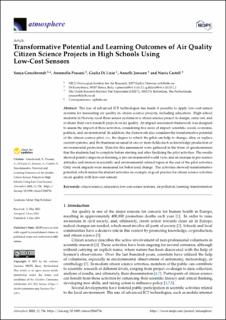Transformative Potential and Learning Outcomes of Air Quality Citizen Science Projects in High Schools Using Low-Cost Sensors
| dc.contributor.author | Grossberndt, Sonja | |
| dc.contributor.author | Passani, Antonella | |
| dc.contributor.author | Di Lisio, Giulia | |
| dc.contributor.author | Janssen, Anneli | |
| dc.contributor.author | Castell, Nuria | |
| dc.date.accessioned | 2021-07-13T08:49:01Z | |
| dc.date.available | 2021-07-13T08:49:01Z | |
| dc.date.created | 2021-07-08T09:16:57Z | |
| dc.date.issued | 2021 | |
| dc.identifier.citation | Atmosphere. 2021, 12, 736. | en_US |
| dc.identifier.issn | 2073-4433 | |
| dc.identifier.uri | https://hdl.handle.net/11250/2764249 | |
| dc.description.abstract | The rise of advanced ICT technologies has made it possible to apply low-cost sensor systems for measuring air quality in citizen science projects, including education. High school students in Norway used these sensor systems in a citizen science project to design, carry out, and evaluate their own research projects on air quality. An impact assessment framework was designed to assess the impact of these activities, considering five areas of impact: scientific, social, economic, political, and environmental. In addition, the framework also considers the transformative potential of the citizen science pilot, i.e., the degree to which the pilot can help to change, alter, or replace current systems, and the business-as-usual in one or more fields such as knowledge production or environmental protection. Data for this assessment were gathered in the form of questionnaires that the students had to complete before starting and after finalizing the pilot activities. The results showed positive impacts on learning, a pro-environmental world view, and an increase in pro-science attitudes and interest in scientific and environmental-related topics at the end of the pilot activities. Only weak impacts were measured for behavioral change. The activities showed transformative potential, which makes the student activities an example of good practice for citizen science activities on air quality with low-cost sensors. | en_US |
| dc.language.iso | eng | en_US |
| dc.rights | Navngivelse 4.0 Internasjonal | * |
| dc.rights.uri | http://creativecommons.org/licenses/by/4.0/deed.no | * |
| dc.title | Transformative Potential and Learning Outcomes of Air Quality Citizen Science Projects in High Schools Using Low-Cost Sensors | en_US |
| dc.type | Peer reviewed | en_US |
| dc.type | Journal article | en_US |
| dc.description.version | publishedVersion | en_US |
| dc.rights.holder | © 2021 by the authors. Licensee MDPI, Basel, Switzerland. | en_US |
| dc.source.pagenumber | 15 | en_US |
| dc.source.volume | 12 | en_US |
| dc.source.journal | Atmosphere | en_US |
| dc.identifier.doi | 10.3390/atmos12060736 | |
| dc.identifier.cristin | 1920907 | |
| dc.relation.project | EC/H2020/824603 | en_US |
| dc.relation.project | NILU - Norsk institutt for luftforskning: 119024 | en_US |
| dc.source.articlenumber | 736 | en_US |
| cristin.ispublished | true | |
| cristin.fulltext | original | |
| cristin.qualitycode | 1 |
Tilhørende fil(er)
Denne innførselen finnes i følgende samling(er)
-
Publikasjoner fra Cristin - NILU [1329]
-
Vitenskapelige publikasjoner [1068]
Vitenskapelige artikler, kapitler og monografier.

